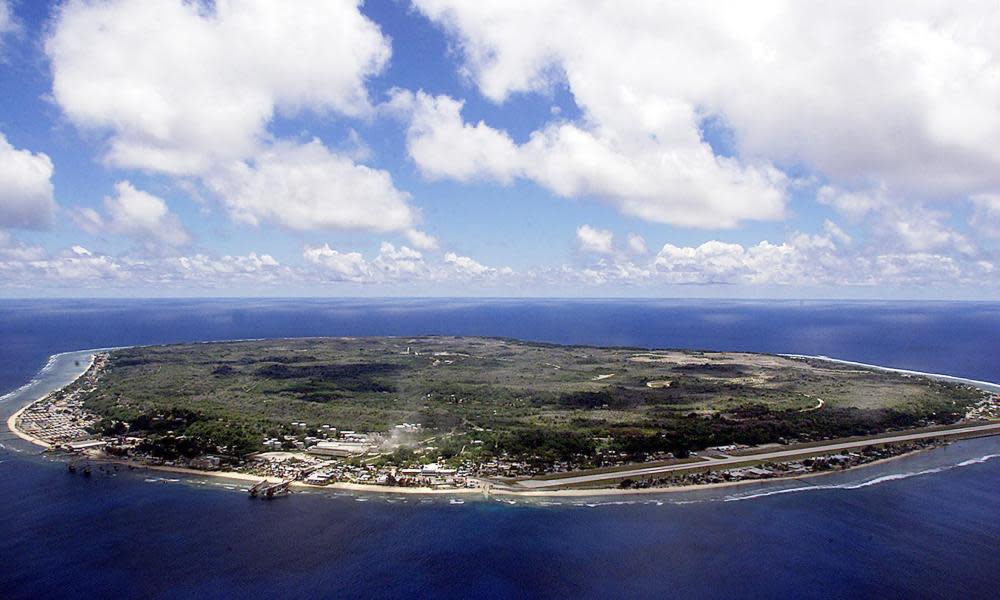Parent company of Nauru offshore operator fails to file reports in apparent breach of corporations law

The parent company of the firm that runs Australia’s offshore processing regime on Nauru has failed to lodge financial reports with the corporate regulator on time, in an apparent breach of corporations law.
The Australian Securities and Investments Commission has confirmed that it has registered a “report of misconduct” against Rard No 3, the Brisbane-based company that wholly owns Canstruct International, following the Guardian’s inquiries. The potential penalty for filing a report late is a fine of more than $25,000.
Canstruct International has earned $1.82bn since 2017 running Australia’s sole offshore processing operation on the Pacific island. Its contract to provide “garrison and welfare services” for a little over 100 refugees and asylum seekers held on the island was extended last week – its eighth noncompetitive extension – for another six months, for $218.5m.
Related: Nauru offshore regime to cost Australian taxpayers nearly $220m over next six months
The government’s latest figures, provided to senate estimates, state 107 people are held on Nauru: 81 of these have had their claim to refugee status formally recognised. But the Guardian understands several refugees from Australia’s former offshore system on PNG have recently been transferred to Nauru, and there are now 115 people on Nauru under Canstruct’s authority.
It currently costs Australian taxpayers more than $4m a year to hold one person within the Nauru offshore regime – a little over $11,000 per person per day.
Rard No 3 was required to lodge its financial report for the 2020/21 financial year by 30 November 2021: Australian companies were granted a one-month extension because of “challenges presented by Covid-19 conditions”.
A spokesperson for Asic confirmed to Guardian Australia that Rard No 3 had failed to report by the extended deadline and the report had still not been lodged nearly two months later. The spokesperson also confirmed Rard No 3 had consistently lodged late every year since it began filing reports three years ago. Asic has not commenced a prosecution against Rard No 3.
The spokesperson said the potential penalty for reporting late was a fine, currently $26,640.
A company spokesperson told Guardian Australia in a statement: “Rard No 3 has lodged all previous financial reports and the current [2020/21] report will be lodged very soon. Canstruct has at all times been solvent, all of our statutory payments are up to date, and our books have been externally audited.
“This year’s report has been slightly impacted by Covid-related delays as we rely on third-party compliance information. This information has taken longer than usual to receive. It is inaccurate to suggest that a slight delay is a criminal breach of the Corporations Act.
“Canstruct has always complied with overall reporting obligations and our accountants will be ensuring that we continue to do so.”
Canstruct International’s Nauru contract with the federal government contributes the vast majority of Rard No 3’s revenue and profits.
Previous financial reports from Rard No 3 – also filed several months late according to the Asic register – show a dramatic increase in profits, from $69.5m after tax in 2018/19 to $101m in 2019/20.
Related: Australia signs deal with Nauru to keep asylum seeker detention centre open indefinitely
While no new asylum seeker arrivals have been sent to Nauru since 2014, the offshore operation there continues to cost Australia between $35m and $40m a month on average, the same amount it did when the detention centre held more than 1,000 people.
Canstruct’s contract on Nauru has attracted public attention, and forensic questioning in the Senate.
The October 2017 “letter of intent” awarded to Canstruct International was worth $8m. Less than a month after this was signed, the company won a $385m contract awarded by limited tender, meaning there was no open or competitive process to secure the contract.
An auditor general’s report found while the department’s procurement process for Nauru was “largely appropriate”, it was critical of the original contract, saying “it is not clear why the department could not have secured a replacement supplier using a more competitive procurement method”.
Since then, government figures show eight further amendments, all uncontested, have escalated the total cost to $1.82bn.
The Guardian revealed in November that Canstruct International had just $8 in assets and had not commenced trading when it was awarded the contract.
And the government has since confirmed in evidence to the senate that a “financial strength assessment” it ordered – conducted by KPMG to test the suitability of the company – was actually done on a different company.
The Canstruct group of companies, or entities associated with it, have made 11 donations to the Liberal National party in Queensland.
A spokesperson for the Department of Home Affairs said the Australian government remained committed to regional processing as a key pillar of Operation Sovereign Borders.
“Australia is working with Nauru to establish an enduring regional processing capability in Nauru.”
In 2015, Hancock Prospecting, the mining company owned by billionaire Gina Rinehart, was fined $130,000 for failing to file financial reports on time between 2008 and 2012.
The business was fined after pleading guilty to 13 counts of breaching section 319 of the Corporations Act.

 Yahoo Movies
Yahoo Movies 
